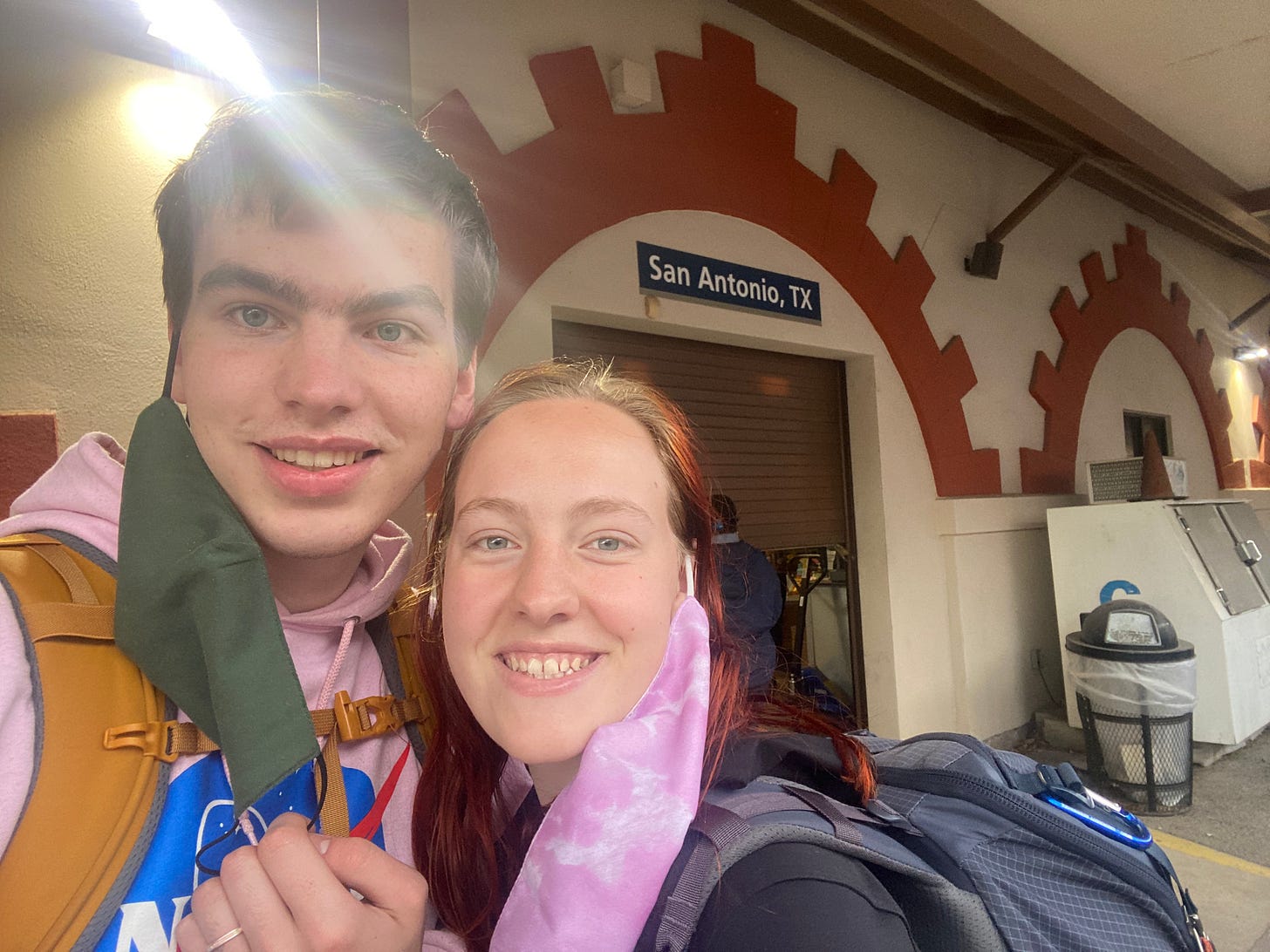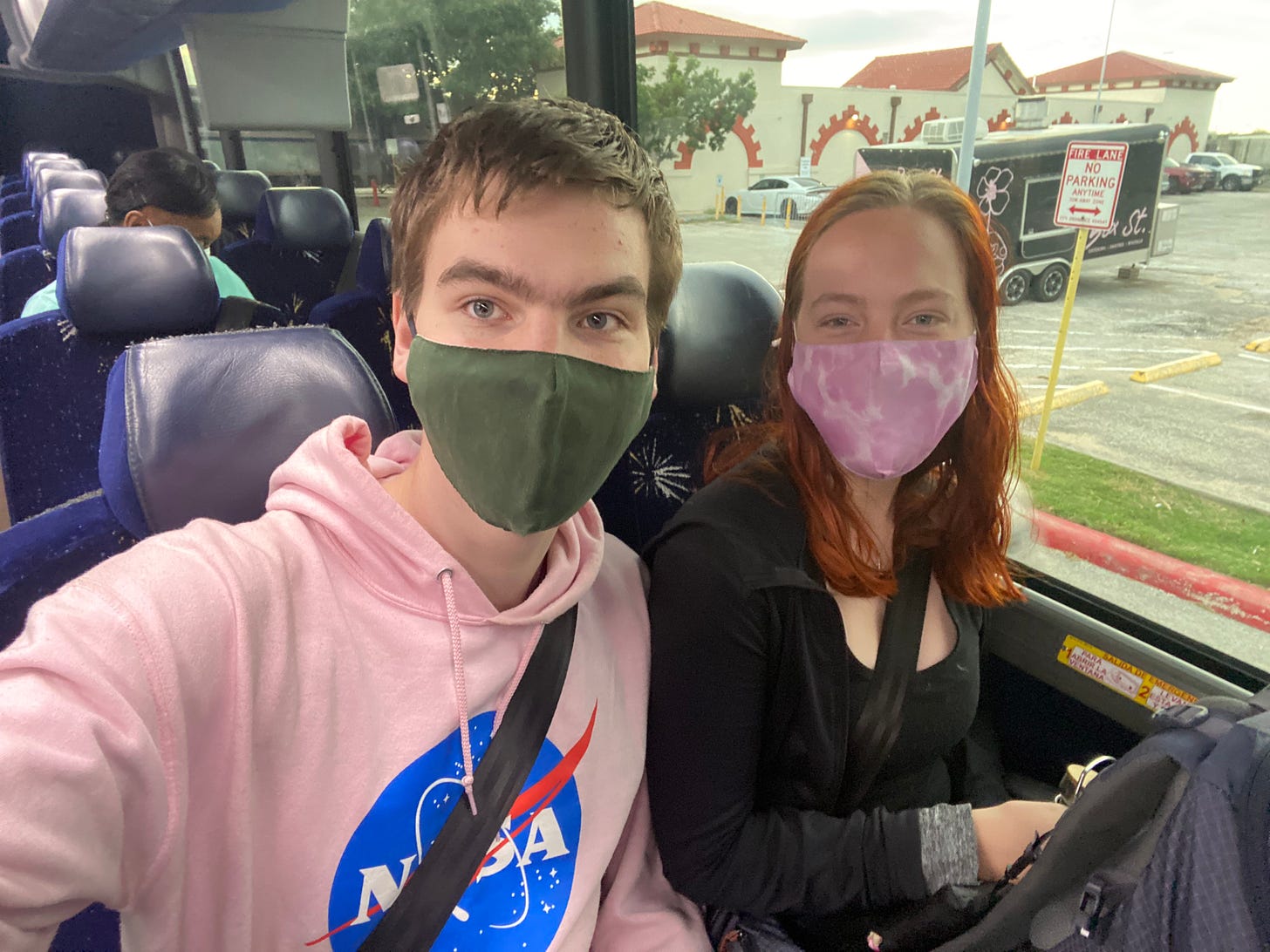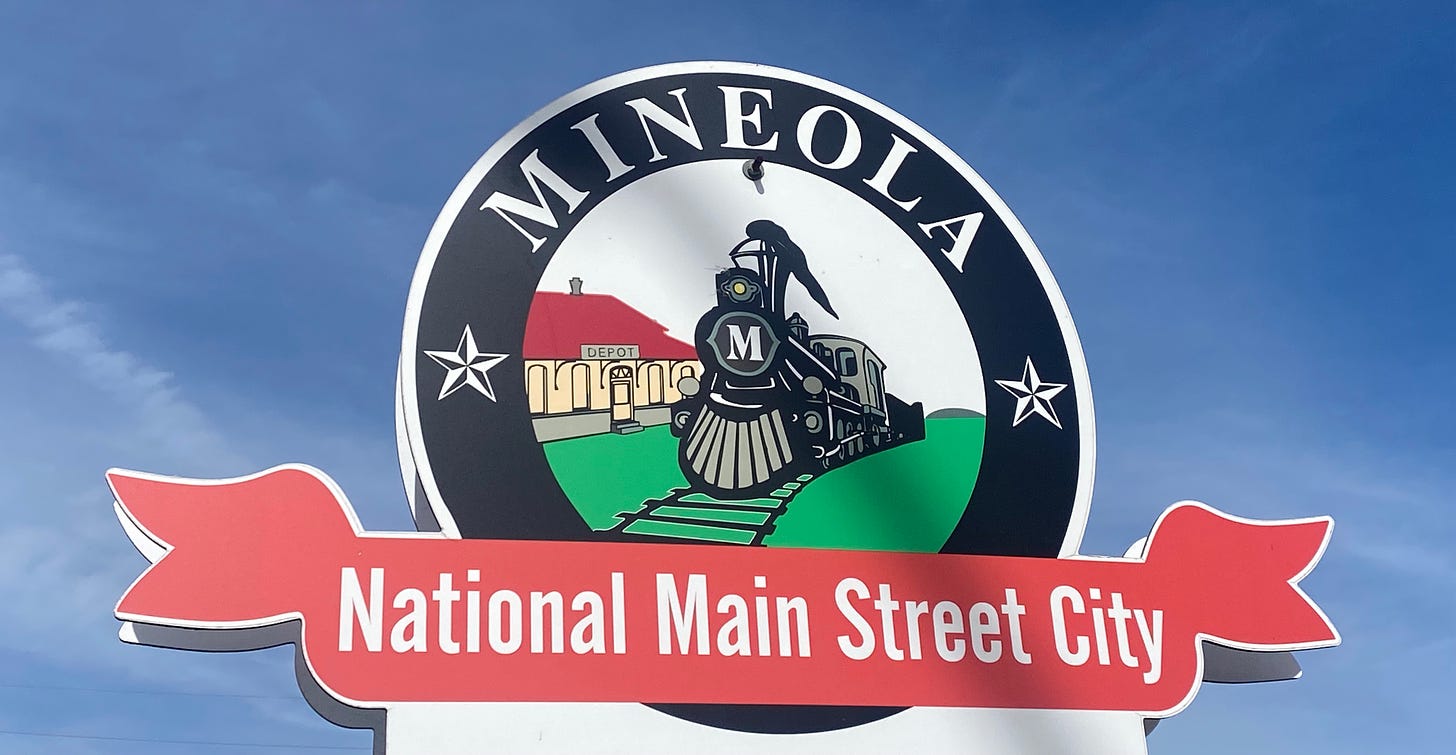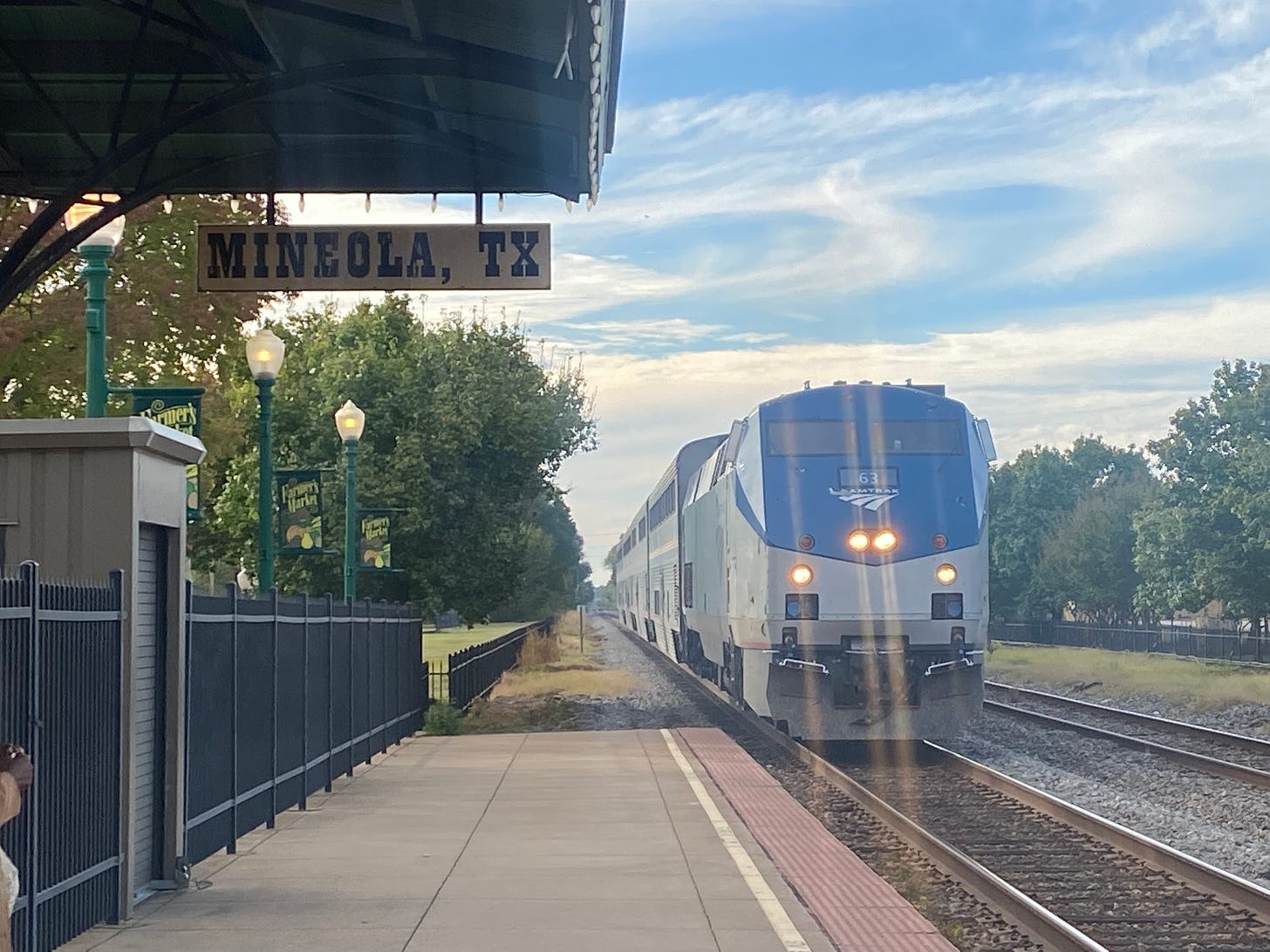Writing yesterday, I complained a lot about our situation. I figured the day ahead would be straightforward, though: we’d go through Texas, it would be surprisingly big (even when expecting the surprise), I’d make some jokes about how far Texas’ borders are from each other… all would be well again.
But the rest of yesterday… didn’t go that smoothly. In fact, as I start writing this, we’re still in Texas, in our 27th straight hour of “travel.”
Our first morning stop was San Antonio (two hours after I finally went to bed). Here, they’d normally split off the last two cars (with us onboard), attach them to a different train to Chicago, and have the rest of the train continue to New Orleans (much like the Lake Shore Limited does to Boston).
However, we started out the leg running 5 hours late… and despite gunning it through West Texas, still pulled into San Antonio an hour behind schedule. The train to Chicago that we were going to be attached to? It had already left, and was an hour on its way to Dallas!
So my morning alarm was an ungracious intercom announcement: “Hey, everyone! We’re still running late, and your train already left, so it’s time for you to hop off and get on a bus!” Delightful.
The plan seemed pretty straightforward. We’d go to Fort Worth, faster than the Chicago-bound train because it had to stop a lot, and board there. A bit inconvenient, but who cares? There was still adequate leg room, and we’d get a closer view of the Texas roadside.
Soon, our bus started headed out—and our driver announced the projected time to Mineola (note: not Fort Worth). 5 hours.
Hmmm, interesting. That made sense too, I guess? Lots of people probably get on in the DFW area, and they didn’t have the extra two cars to house us, so it’d be safer to rendezvous at a later stop for (1) more capacity and (2) less risk that our timing would be off and we’d miss the train again.
But why wouldn’t they tell us directly? Why bother lying to us? Did the Amtrak people coordinating this just not know what they’re doing?
A few hours later, our bus pulled into a giant highway-side gas station. While it fueled, we ran inside—and scored two bananas and a quart of milk (alongside some chips & queso for a later snack). Wow, fresh food tastes amazing!
Then, it was back on the road: and after three hours, right on schedule, we arrived at the middle-of-nowhere town of Mineola, TX.
It’s a quaint little town—has about 5000 people. Apparently it was a key location in the early days of Texan railroads; it’s near an important junction, and had a lot of forests around that were very well suited to producing tens of thousands of rail ties to build out the West’s first basic infrastructure.
We had to sit there for three hours until the train arrived, and extended bemusement becomes boredom. Pretty quickly, we discovered that our queso had rolled away on the bus and been stolen, so I visited a nearby CVS to get more. They were out of stock. (And that’s all the excitement we had there!)
There are lots of people who smoke in the South. This has been a significant culture shock for us; I probably went years growing up in Seattle without ever seeing a cigarette. The eclectic group we were cooped up with on this adventure for 10 hours fit that role—being ~80% smokers—and alternated between stinking up the nature around us and getting increasingly agitated when kept under a roof. The former dominated at Mineola station; our boring three-hour wait was mostly spent suffering from secondhand smoke.
Eventually, though, our train came to save us—on schedule, actually!
But don’t get your hopes up—nothing Amtrak operates can stay on schedule for long! 7 hours later, we were running 4.5 hours late again.
Every once in a while, train track needs to be repaired. You do this by ripping out the old, worn-down steel rails, and replacing them with fresh new ones. A side-effect of such maintenance is that it makes the track impassable.
Shortly after Mineola, just such maintenance was being done along track that we’d normally take to two small stations. So we rerouted in a strange loop around the area, ripping through the countryside at ~15mph for a while. This set us back an hour or so—it’s a shame that Amtrak couldn’t have possibly predicted this delay and built it into their timetable estimates! Right? If only we had the technology… 🤷
But wait, there’s more! It’s not only track needs to be cycled to retain performance; crew (engineers to drive the train and conductors to wrangle passengers) do too. Routes are designed with changeover points in mind: every few dozen stations, the current crew gets off and a new one boards.
In North Texas, we were due for a changeover—and indeed, Amtrak had our crew waiting at the station when we were set to arrive. The only problem? You guessed it: that was one of the two stations we skipped because of the (apparently completely unforeseen) track maintenance!
Somewhere along the line, some genius at Amtrak figured out that this problem existed. So we stopped—stopped!—at the next station down the track, and waited for a whole hour until the new crew showed up in a taxi. Incredible.
Okay, so now we’re about 1.5 hours late. Manageable? You’d hope, but no.
Amtrak doesn’t own their own rail lines; they lease capacity from various freight networks. This means that they’re given a specific slot for each route—the track is reserved for trains to go through chokepoints at a certain time, and there are high-priority freight trains scheduled directly before and after them.
But when we run 1.5 hours late, we can’t take our allotted slot anymore! So, ever since taking the new crew onboard, we have to sit in a siding every time a freight train comes nearby—squeezing into the cracks in the schedule to make any sort of progress. This happened three times.
First we were due to arrive in Texarkana at 8:30p. Then 10:00p. Then 10:30p. Then 10:45p. 11:00p was the last projection the crew made before giving up. At 12:15a, the train finally pulled in and we stepped out for fresh air—only to be greeted by the aroma of 20 smokers lighting up!
(It’s been a long day. Apologies if my writing is long-winded or otherwise subpar.)








Oh, my ... what doesn't kill you ... makes for a more interesting story. Maybe re-thinking that two-hour Coast Starlight connection?
Love the title, ...Amroad. :-)